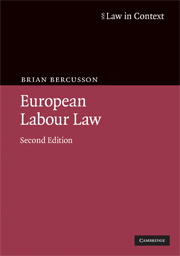Book contents
- Frontmatter
- Contents
- Preface
- Section I Labour law and Europe
- 1 European labour law and the social dimension of the European Union
- 2 EU labour law and the UK
- 3 The conceptualisation of European labour law
- 4 Shifting strategies 1951–1986: ECSC, EEC, harmonisation, financial instruments, qualified majority voting
- 5 The strategy of European social dialogue
- 6 The European Employment Strategy, the open method of coordination and the ‘Lisbon Strategy’
- 7 The strategy of fundamental rights: the EU Charter of Nice 2000 and a ‘constitutional’ strategy
- Section II The structure of European labour law
- Section III The futures of European labour law
- Index
- References
1 - European labour law and the social dimension of the European Union
from Section I - Labour law and Europe
Published online by Cambridge University Press: 05 June 2012
- Frontmatter
- Contents
- Preface
- Section I Labour law and Europe
- 1 European labour law and the social dimension of the European Union
- 2 EU labour law and the UK
- 3 The conceptualisation of European labour law
- 4 Shifting strategies 1951–1986: ECSC, EEC, harmonisation, financial instruments, qualified majority voting
- 5 The strategy of European social dialogue
- 6 The European Employment Strategy, the open method of coordination and the ‘Lisbon Strategy’
- 7 The strategy of fundamental rights: the EU Charter of Nice 2000 and a ‘constitutional’ strategy
- Section II The structure of European labour law
- Section III The futures of European labour law
- Index
- References
Summary
Introduction European labour law challenges the dominance of EU economic law
The European Economic Community (EEC) created by the Treaty of Rome of 1957 had as its central core the economic law of the EEC. Despite its transformation into the European Union (EU), European law remains dominated by the economic law perspective of establishment of a common market. But European integration is no longer a purely economic project. European labour law is a central part of the political and social dimension of the EU.
European labour law as a central component of the European Union poses a fundamental challenge to the economic law profile of the EC. Labour was posited in the Treaty of Rome as one of the factors guaranteed free movement, along with capital, goods and services. As such, labour was equated to a commodity. By so doing, the EEC challenged a fundamental premise of international labour law, embodied in the constitution of the ILO: that labour is not a commodity.
Labour is not the same as goods, services or capital. Labour engages human beings. Living in the EU means for most people spending the greater part of their adult waking life working. The EU law which addresses that part of people's lives, EC labour law, is much more directly central to the peoples of Europe than the regulation of capital movements, financial services, take-overs and mergers, international trade or customs duties or other barriers to free movement of goods and services, which absorbs most of the attention of EC lawyers.
- Type
- Chapter
- Information
- European Labour Law , pp. 3 - 41Publisher: Cambridge University PressPrint publication year: 2009



